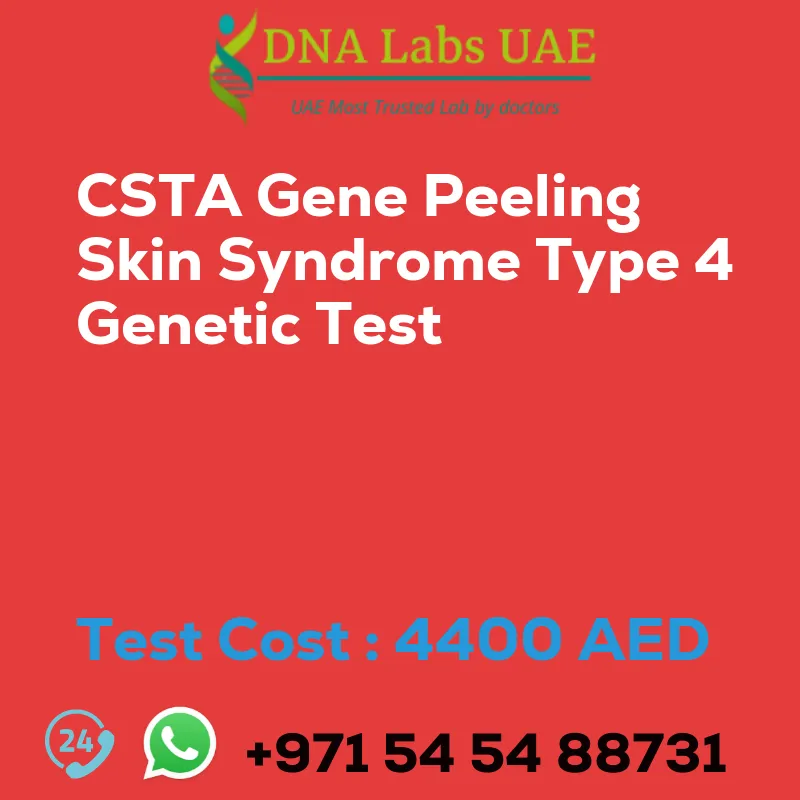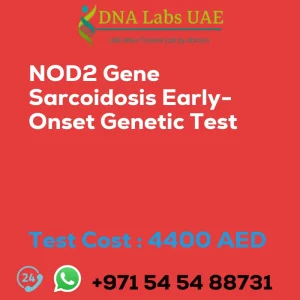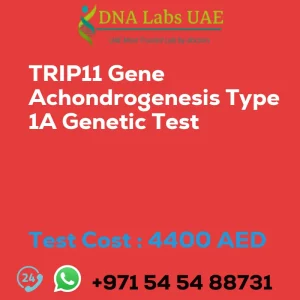CSTA Gene Peeling Skin Syndrome Type 4 Genetic Test
Welcome to DNA Labs UAE, where we offer the CSTA Gene Peeling Skin Syndrome Type 4 Genetic Test. This test is designed to diagnose and understand Peeling Skin Syndrome Type 4 (PSS4), a rare genetic disorder associated with the CSTA gene.
Test Details
Peeling Skin Syndrome Type 4 is characterized by excessive shedding of the outermost layer of the skin, leading to peeling, blistering, and skin erosions. It is an autosomal recessive condition, meaning that individuals need to inherit two copies of the mutated gene (one from each parent) to develop the disorder.
Our CSTA Gene Peeling Skin Syndrome Type 4 Genetic Test utilizes Next-Generation Sequencing (NGS) technology. NGS genetic testing allows for the simultaneous analysis of multiple genes, including the CSTA gene. This comprehensive analysis enables the detection of various genetic mutations or variations within the gene.
By performing this NGS genetic test, our healthcare professionals can identify any mutations or variations that may be responsible for causing Peeling Skin Syndrome Type 4. This information is crucial in confirming a diagnosis, understanding the underlying genetic cause of the disorder, and guiding appropriate treatment and management strategies.
Test Components and Price
- Test Name: CSTA Gene Peeling Skin Syndrome Type 4 Genetic Test
- Components: NGS Technology
- Price: 4400.0 AED
Sample Condition and Report Delivery
To perform the test, we require either blood or extracted DNA, or just one drop of blood on an FTA Card. The report will be delivered within 3 to 4 weeks after the sample is received.
Referring Doctor and Test Department
The CSTA Gene Peeling Skin Syndrome Type 4 Genetic Test is recommended by dermatologists and falls under the Genetics department.
Pre-Test Information
Prior to the test, we request a clinical history of the patient who is going for the CSTA Gene Peeling Skin Syndrome Type 4 NGS Genetic DNA Test. Additionally, a genetic counseling session will be conducted to draw a pedigree chart of family members affected by the CSTA Gene Peeling Skin Syndrome Type 4 NGS Genetic DNA Test gene CSTA.
Don’t let Peeling Skin Syndrome Type 4 go undiagnosed. Get the answers you need with the CSTA Gene Peeling Skin Syndrome Type 4 Genetic Test at DNA Labs UAE. Contact us today to schedule your test and take the first step towards understanding and managing this rare genetic disorder.
| Test Name | CSTA Gene Peeling skin syndrome type 4 Genetic Test |
|---|---|
| Components | |
| Price | 4400.0 AED |
| Sample Condition | Blood or Extracted DNA or One drop Blood on FTA Card |
| Report Delivery | 3 to 4 Weeks |
| Method | NGS Technology |
| Test type | Osteology Dermatology Immunology Disorders |
| Doctor | Dermatologist |
| Test Department: | Genetics |
| Pre Test Information | Clinical History of Patient who is going for CSTA Gene Peeling skin syndrome type 4 NGS Genetic DNA Test. A Genetic Counselling session to draw a pedigree chart of family members affected with CSTA Gene Peeling skin syndrome type 4 NGS Genetic DNA Test gene CSTA |
| Test Details |
The CSTA gene is associated with a rare genetic disorder called Peeling skin syndrome type 4 (PSS4). PSS4 is characterized by excessive shedding of the outermost layer of the skin, leading to peeling, blistering, and skin erosions. It is an autosomal recessive condition, meaning that individuals need to inherit two copies of the mutated gene (one from each parent) to develop the disorder. NGS (Next-Generation Sequencing) genetic testing is a type of genetic testing that allows for the simultaneous analysis of multiple genes, including the CSTA gene. NGS technology enables the detection of various genetic mutations or variations within a gene, providing a comprehensive analysis of the genetic information. By performing an NGS genetic test on the CSTA gene, healthcare professionals can identify any mutations or variations that may be responsible for causing Peeling skin syndrome type 4. This information can help in confirming a diagnosis, understanding the underlying genetic cause of the disorder, and guiding appropriate treatment and management strategies. |








